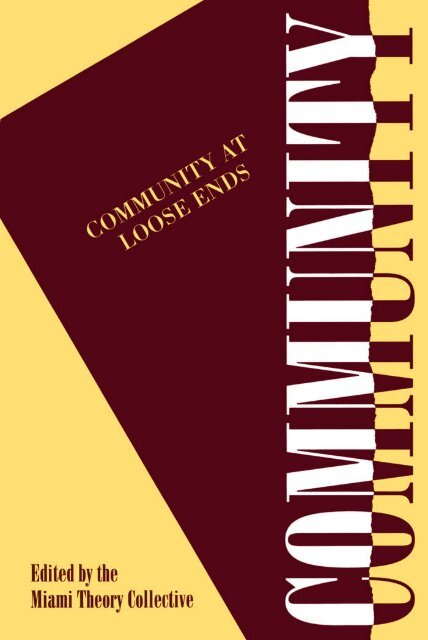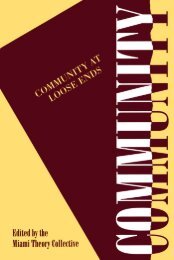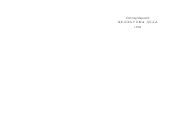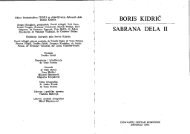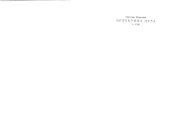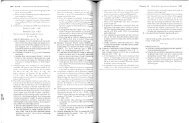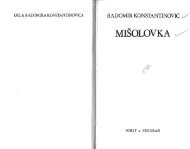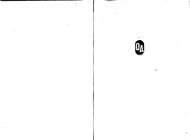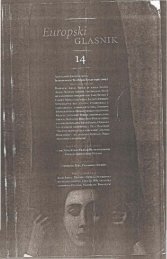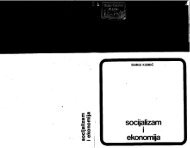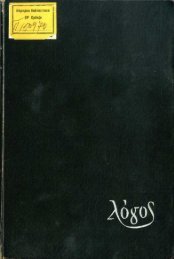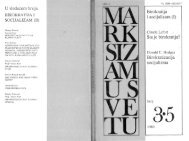Christopher Fynsk
Christopher Fynsk
Christopher Fynsk
- No tags were found...
Create successful ePaper yourself
Turn your PDF publications into a flip-book with our unique Google optimized e-Paper software.
20 CHRISTOPHER FYNSKanalysis of the forms of cultural or social representation and all reflection on thatanalysis itself) constitutes a thinking response to this testimony.There are, of course, many exceptions to this judgment, but I would say thatthe very discursive structure of "theory" as it is practiced in the university todaycontributes to muffle or even foreclose the testimony of the absence of community.Exceptions occur when this structure breaks down, or when it is pushed toits limits—when for some reason or other it exposes its limits. But when theorystays within its limits (and this is no less true of interdisciplinary theory), it doesnot hear and it does not say the absence of community. Only a kind of echo of itssilencing can be heard in it. By virtue of this trace, its silence, too, belongs to thetestimony of which Nancy speaks; and in this way Nancy's statement is not at allbelied by the empty speech of theory. But the volume of its speech and its ubiquityin the university certainly make the testimony exceedingly difficult to hear.And I think we should be aware of the risk that this colloquium may not improvethe situation —though it will be doing something if it spreads at least a sense ofdistress at the absence of distress.Now, I would reiterate that if I think the language of theory silences the testimonyof the absence of community, it is because the very structure of theoreticaldiscourse prohibits it from being a language of community (I'll return to thisin a moment). But I want to note as well —if only in passing, though I think thepoint should not be forgotten here—that if theoretical discourse in the academy ismarked by an absence of distress about the absence of community, this is also forsociopolitical and institutional reasons. If time permitted (or if I had the means todo it quickly and effectively), I would want to say something about the place oftheoretical discourse in the university, whose technical organization promotes orat least favors theory's silence. I would want to add a few words in turn about theisolation of the university in the United States from a larger sphere of culturalactivity and about the way in which the academic disciplines concerned with culturetend to be cut off from any general public debate about the historical situationof U.S. society. I would want to say something about how the "culture ofprofessionalism," a kind of simulacrum of community, fills the void created bythis separation, and how a critical analysis undertaken apart from any ongoingengagement in public debate (or marginalized in that debate, as Said puts it inThe World, the Text, and the Critic) will inevitably empty out—for if the criteriafor a selection of topics for study and for an evaluation of research are generatedsolely within the sphere of academic discourse, this discourse can represent onlyitself.With all of this, I would want to be saying something about the institutionalconditions of what I might call the loss of the object (die Sache, la Chose) in thepractice of theory and criticism in this country today, and I would want to relatethis loss to its sociohistorical conditions: namely the place of the university in alarger cultural context where we also glimpse something like a loss of the
COMMUNITY AND THE LIMITS OF THEORY 21object—the object being history. In other words, I would want to relate the absenceof distress in the discourses of theory to the absence of community as itmanifests itself most immediately in our culture and sociopolitical institutions.But, again, a sociohistorical analysis is required here that goes beyond my currentmeans: one that is grounded in an analysis of our political institutions, butthat is also capable of moving to a level of reflection we find in Heidegger's meditationon Technik, and thus at the historial level, or at the level of the question ofBeing. Because what we are dealing with, once again, is the loss of the object:existence in its historicity and materiality. Or perhaps not its loss, because, as myfriend Rodolphe Burger once said during a visit to this country: "There's a hellof lot of Dasein here." Not its loss, then, but a repression of what Nancy mightcall its communication, so powerful that the forces of homogeni/ation in thedominant culture remain unsettled by it.The qualification I have just made about the loss of the object in the culture inthe United States should also be made about theoretical and critical discourse inthe university. While I can't quite give up my adherence to the statement fromwhich I started, I sense also that it indulges in what Jean-Franc.ois Lyotard mightterm piety. It would be misleading to suggest that the voice of community (whichtoday says the absence of community and is thus calling for another thought ofcommunity) is not speaking in all sorts of ways and at all sorts of sites in the fieldof theory. The problem is rather that in general it is not heard as such and meditatedupon as a testimony of community and as saying something about our historicalsituation. It would also be misleading, indeed it would be misguided, tosuggest that the only discourse contributing to the struggle to liberate the communicationof existence in its historicity and materiality is one that seeks to effectthat communication. We cannot do without theory: that is to say, we cannot dowithout a representation of our sociohistorical situation and we cannot do withoutthe forceful representation of political positions. But if we limit our understandingof critical discourse to its representational or interpretive function, thenwe cannot conceive of its political import outside the bounds of what RichardRorty has called "edification."To illustrate what I am saying about the limits of theoretical or critical discoursewhen it limits itself to the task of interpretation (even when "interpretation"is understood as being always the interpretation of other interpretations), Iwould like to pause over Rorty's definition of this term, "edification." The notionis perhaps somewhat simplistic (for "pragmatic" reasons, we might say),but nevertheless extremely revealing about pragmatic assumptions concerninglanguage—assumptions that inform, I believe, a large portion of theoretical andcritical activity in this country, and thus contribute to inhibiting reflection oncommunity as Nancy has tried to define the term. (If time permitted, it wouldalso be appropriate to show how these assumptions inform Rorty's"liberalism"—I leave the term to its ambiguity — and his apology for North
22 CHRISTOPHER FYNSKAmerican socioeconomic institutions; but I would also have to add that the sameassumptions inform more severe and more progressive cultural criticism.)Rorty uses the term "edification" in his volume Philosophy and the Mirror ofNature (357-T2) 2 in order to designate the function of philosophy in a ' 'postphilosophicalcontext" (that is, after the collapse of foundational philosophy) —acontext in which philosophy would no longer hold a privileged point of view inthe search for a community's self-representation, but would join literature andthe other discourses of culture in what Rorty calls a "conversation." "Edification"has a dual meaning in this postphilosophical perspective. It designates: (1)the elaboration of the best possible representation of a community's historicalsituation and goals, and (2) the critical practice of demonstrating that this representation(like all representations) is only a possible representation. Accordingly,Rorty recognizes two modes of edifying philosophy: the "hermeneutic" and the"therapeutic." 3 By the former, Rorty refers to a practice of interpretation conceivedroughly on the model of Gadamerian dialogue and consisting of a movementbetween the "incommensurable" discourses of a culture or cultures. Thediscourses of a culture are "incommensurable" not in principle, according toRorty, but rather, if one may say so, by lack of principle—that is to say, by reasonof the lack of criteria with which one might evaluate the truth-claims of one discoursein relation to another. We have, for example, no transcendental vantagepoint that would allow us to arbitrate between the descriptions of man providedby anthropology, by cybernetics, by philosophy, or by literature. Nor do we haveany justification, in Rorty's view, for arguing that such discourses are irreducibleto one another or in principle incomparable; by "incommensurable" Rortymeans simply that no comparison is possible in the sense that each discoursecould be evaluated in relation to a common measure furnished by a formal analysisof language or a theory of representation. A hermeneutic passage betweendiscourses is possible, therefore, even a synthesis —but this synthesis does notprovide the truth of the discourses in question. Its truth-value will be determinedsolely by consensus in the light of its internal cohesion and its extension: thequantity of data it allows us to account for. Hermeneutics is therefore a way of"seeing how things hang together" without seeking their rational grounding—aweaving of discourses at the service of the community's tasks of self-definition(or self-formation: Bildung) and self-affirmation.Rorty's definition of the second mode of edification, what I am calling "therapeuticphilosophy," is in fact contained in that of the first. "Therapeutic philosophy"represents the critical moment in edification that renders possible thework of hermeneutics as a conversation between incommensurable discourses. Itconducts the critique of representation that liberates hermeneutics from the constraintof reference and recalls to this same hermeneutics that its representationsare historically conditioned interpretations that are always subject to revision. Inthis critical function, therapeutic philosophy is always "secondary" or "para-
COMMUNITY AND THE LIMITS OF THEORY 23side" in relation to the production of representations in the hermeneutic process.It serves merely to keep the conversation open by "denaturalizing" any languageor discourse that threatens to impose itself as the language of nature itself— thelanguage that gives access to things in their truth. It serves to protect againstany epistemological or foundational temptation, and consequently the styleproper to it is satire, parody, and aphorism. For Rorty, the heroes of this style areNietzsche, Wittgenstein, Heidegger, and Derrida.Rorty thus defines (and seeks to contain) the critique of the metaphysics ofrepresentation developed in modern Continental philosophy as the "negative"moment within the dialectics of edification (a hermeneutic activity opened andkept in motion by a therapeutic auto-critique —the latter always in the service ofthe former). But to do so he must leave aside everything in this critique thatwould bring into question his essentially instrumentalist view of language and thepragmatist assumption that the horizon of human linguistic activity is that of thecommunicable meaning established in consensus by free subjects. Those familiarwith the "therapeutic" texts in question will recognize that what Rorty leavesaside is thus nothing other than the key elements of the philosophy of languageelaborated in them: in general, all thought of the historical (and ontological —inHeidegger's vocabulary, "historial") conditions of the production of meaningand of the subject's signifying activity. Rorty accepts the notion that language isconstitutive of experience, but he understands this to mean that the subject constitutesthe meaning of its experience —not, as the "therapeutic" authors suggest,that language is in some sense constitutive of the subject. In a word, Rortywould save from the critique of representation the subject of representation itself.We see Rorty's effort to limit the thrust of the critique of representation in apassage in which he attempts to group Wittgenstein and Heidegger together asexamples of therapeutic edifying philosophers. Rorty has named Nietzsche andHeidegger and is discussing how such authors are attacked by traditional philosophersfor not practicing "philosophy":The problem for an edifying philosopher is that qua philosopher he is inthe business of offering arguments, whereas he would like simply tooffer another set of terms, without saying that these terms are the newfoundaccurate representations of essences. . . . He is, so to speak,violating not just the rules of normal philosophy (the philosophy of theschools of his day) but a sort of meta-rule: the rule that one maysuggest changing the rules only because one has noticed that the oldones do not fit the subject matter, that they are not adequate to reality,that they impede the solution of the eternal problems. . . . They refuseto present themselves as having found out any objective philosophy.They present themselves as doing something different from, and moreimportant than, offering accurate representations of how things are. It ismore important because, they say, the notion of "accurate
24 CHRISTOPHER FYNSKrepresentation'' itself is not the proper way to think about whatphilosophy does. . . . Whereas less pretentious revolutionaries canafford to have views on lots of things which their predecessors hadviews on, edifying philosophers have to decry the very notion of havinga view, while avoiding having a view about having views. This is anawkward, but not impossible position. Wittgenstein and Heideggermanage it fairly well. One reason they manage it as well as they do isthat they do not think that when we say something we must necessarilybe expressing a view about a subject. We might just be sayingsomething—participating in a conversation rather than contributing to aninquiry. Perhaps saying things is not always saying how things are.Perhaps saying that is itself not a case of saying how things are. Bothmen suggest we see people as saying things, better or worse things,without seeing them as externalizing inner representations of reality.. . . We have to drop the notion of correspondence for sentences as wellas for thoughts, and see sentences as connected with other sentencesrather than with the world. (Philosophy, 370-72)Rorty's point here is fairly clear. The therapeutic edifying philosopher is onewho carries out the critique of representation and applies it to his own critique —seeking to avoid setting in place a representation of the true nature of representation.Rorty acknowledges that these philosophers think they are doing somethingother and more important than representation, but since Rorty wants toavoid suggesting that there is any positive dimension to their activity, he limitshis examples of this "something other" to the production of a nontheticdeclaration —a simple that (as in the case of Heidegger), or a speaking that wouldhave only to make us understand that it is just speaking and that words draw theirmeaning from other words and not from their relations to things. (I'll return ina moment to this neutralizing gesture.) In the paragraph that follows the passageI have just cited, Rorty concludes by asking what attitude is appropriate before aphilosopher that refuses to posit anything: "How do we know when to adopta tactful attitude and when to insist on someone's moral obligation to hold aview?" And he responds that we never know: "This is like asking how we knowwhen someone's refusal to adopt our norms (or, for example, social organization,sexual practice, or conversational manners) is morally outrageous and when it issomething we must respect (at least provisionally). We do not know such thingsby reference to general principles" (372). So in the case of therapeutic edifyingphilosophers, as in our political context, our decision will depend on the situationand on our social needs. In a moment of social crisis, it may be that we cannottolerate the behavior of an edifying philosopher, just as we cannot tolerate thebehavior of a social deviant, but the preferable situation in Rorty's eyes is to seekconversation rather than exclusion (and Rorty presupposes that conversationnever, in principle, implies violence).
COMMUNITY AND THE LIMITS OF THEORY 25Now, it is interesting to see how Rorty's liberal attitude is strained when heenters into an overtly political discussion and when it comes to dealing with authorslike Gilles Deleuze and Jean-Franc.ois Lyotard. Once again, he refuses totheir use of language any positive dimension, but he finds no useful therapeuticdimension in their writing. He argues that research that takes on the accents ofthe tragic or the sublime and seeks to expose the precariousness of a regime ororder of meaning by putting into play the possibility of transgression or transcendencecan only be seen as responding to the personal and idiosyncratic needs ofthe individuals who undertake it. 4 For Rorty, the social bond—which he thinks ofessentially in terms of identification (Foucault gets bad marks for a failure toidentify) and such notions as "shared confidence" and "shared hope" —has itssource in and develops with the conversation that unfolds in the horizon of a consensusof communication. This conversation is guided, he says, by the desire toachieve a social harmony in which a society "affirms itself globally," thoughwithout seeking to found itself. One might ask, I think, whether the desire for"global affirmation" is finally separable from the desire for auto-foundation.(The connection here is the concept of will—the fundamental trait of the modernsubject of representation: Heidegger's reading of Nietzsche is invaluable here,and particularly as it reflects upon his own statements in his "Rectoral Address"of 1933. 5 I would note too that if we bring together Rorty's statements on hermeneuticsas Bildung, and consider Rorty's faith in our freedom to change ourrepresentations, we see that we have to do in his thinking with all the basic traitsof the subject of metaphysics: freedom, imagination, will. Once again, an attentivereading will show that Rorty employs the critique of representation to shoreup the subject of representation.) In other words, one might ask whether his notionof consensus does not finally participate in the phantasms of identificationand unification at work in the modern forms of tyranny.But I am less interested here in the dangers of Rorty's notion of consensusthan I am in the nature of what he chooses to marginalize or neutralize with hisaggressive dismissals of discourses with a political agenda that seek to interruptor exceed the horizon of signification. And I would like to suggest that whatRorty is combatting in the name of consensus (which he calls at one point, "thevital force" of a culture ["Habermas, Lyotard et la postmodernite," 196]) is theethical dimension of a writing practice that works at the limits of representation— and ultimately another thought of the grounds of community.I am using the word "ethical" here in the light of Wittgenstein's "Lecture onEthics," in which Wittgenstein considers the possibility of what I might call an"ethical language" or a language that expresses what he calls his ethical experiencepar excellence. 6 This experience is one that recurs, he says, every time hetries to grasp what is meant by ethical value. "The best way to describe it," hewrites, "is to say that when I have it, I wonder at the existence of the world'' (8).The experience, in other words, is the same experience Heidegger tries to express
26 CHRISTOPHER FYNSKin the phrase "that there are beings, and not nothing" —and there is textual evidencesuggesting that when Wittgenstein meditates on the possibility of an ethicallanguage, he is in fact meditating on Heidegger's claims for this veryphrase. 7 Heidegger had suggested that when the phrase "that there are beings,and not nothing" comes to us in the uncanny experience of the Nothing, it givesthe possibility of saying "is" —and thus a relation to ourselves, to others, and toeverything that is. The phrase itself, he said, marks the very possibility of signification,and gives the "is" ("Das es seiendes ist") in an originary fashion—itsays the possibility of significant language, and thus, in a sense, gives languageitself. Heidegger will later call such an event the speaking of language. Now, it isto such an event that Wittgenstein himself points when he offers the hypothesisthat the only possible expression of the miraculous fact of the existence of theworld is the presentation of language itself: "I am tempted to say that the rightexpression in language for the miracle of the existence of the world, though it isnot any proposition in language, is the existence of language itself ("Lecture onEthics" 11). The "correct" expression for the experience of the fact that there issomething would be the expression provided by the existence of language itself—or, in other words, the presentation of the fact that there is language. When languagegives itself as such, there is a saying of Being —the fact that there is somethingrather than nothing.Wittgenstein does not go as far as Heidegger—he does not suggest, as doesHeidegger, that such a saying would mark and remark the opening of our relationto what is, and play in some sense a constitutive role in this experience. In otherwords, he does not suggest that ethical language (if such a thing could beachieved—and Wittgenstein is not sure it could be, though he expresses admirationfor all attempts) would be the condition of ethical experience. But he doessay something that anticipates Heidegger's later turn to the work of art and thelanguage of poetry as the site where the event he is describing presents itself orremarks itself (in other words, as the site —or a site —where language remarksthe fact of its existence). He says, near the beginning of his lecture, that much ofwhat he will have to say about ethics might normally fall into the realm of aesthetics.He says this in part because he designates his ethical experience as sublime,but also because he is meditating on something like a sublime use of language:he is meditating on the possibility of presenting what properly speakingcannot be presented because it is the condition of all presentation or representation.Let me go back now to Rorty. When Rorty cited Heidegger's "that" as aninstance of a "therapeutic" edifying language, he was pointing to what bothWittgenstein and Heidegger were attempting to define as a language at the limitof signification. But he left aside entirely the question of what happens when adiscourse works at that limit; he left it aside because Rorty finally cannot entertainseriously language that is not representational —its value for him is at best
COMMUNITY AND THE LIMITS OF THEORY 27"therapeutic." So he left aside, or simply could not see, Heidegger's (and Wittgenstein's)suggestion that when a discourse produces in some manner the"that," it is saying something of language itself—that the essence of language isspeaking by remarking the very possibility of signification or representation.If time allowed, I would try to explore some examples of the kind of strangenessthat marks a discourse when it produces the equivalent of Heidegger's"that." I would point to Blanchot's notion of language becoming an image ofitself, and try to describe the properly sublime character of some of his fiction. Iwould point to Derrida's notion of the "retraif of metaphor that remarks thefundamental metaphoricity of Being itself. I would dwell upon what Nancy calls"voice," and I would be tempted to consider in the light of this notion thestrange authority that characterized some of Paul de Man's work, and particularlyhis extraordinary verbal performances. Each of these examples points toways in which language might address us or claim us when it "speaks" —andwill perhaps give some sense of what I will finally have wanted to suggest bysaying that only a criticism that is held by language can be said to be answeringto the writing of community as Nancy defines it.A critical or theoretical language that is held by language, I want to suggest,is one that answers to the speaking of language—that answers to what it is abouta text or discourse that remarks the fact of language and thereby says the possibilityof its own representing or signifying. This saying, of course, is not itself asignifying. Once again, what is said is the possibility of signification. Nancy definedsuch a saying in Le Partage des voix as a hermeneia: an annunciation ofmeaning that is originary because its speaking is the opening of meaning — a singulararticulation of the communitary logos (which is only in its articulations).So criticism that is held by the language of a text, for example, is thus one thatanswers to the text's own hermeneia — it allows itself to be claimed by what constitutesthe singularity of the text. And I would like to suggest that any effectivecriticism — that is to say, a criticism that becomes political in the sense defined byNancy in La Communaute desoeuvree — is one that answers by effecting in itsturn a hermeneia.If we follow Nancy's argument concerning the singularity of any act that saysthe possibility of signification (and Nancy is in strict conformity with Heideggeron this point), then we would have to acknowledge, in fact, that any criticism orinterpretation that exposes in a text the hermeneia of that text, its saying of theopening of meaning it effects, is itself a hermeneia. It could not be the simplereception and re-presentation of the address of the text it reads, but must producein its turn, and in response, a singular speaking of language. It must divide thelogos in its turn. There could be no opening to the opening of meaning that didnot itself articulate meaning in an originary fashion. 8 Heidegger would put it thisway: The response to language that brings language to speak must be thought asanticipatory —both receptive, and, I would say, provocative. The response to Ian-
28 CHRISTOPHER FYNSKguage has of necessity a performative dimension —it provokes the address. Soany criticism that answers in this sense to the writing of community will be in itsturn the writing of community.I approached the task of writing this paper by asking myself the followingquestion: If theoretical discourse silences the testimony of the absence of community,what language would respond to this testimony and answer thereby to thepolitical reality of our time? What would a politically effective language be in thedisciplines that concern most immediately the majority of those of us here: thedisciplines concerned with the forms of cultural representation, and more particularlyliterature, conceived in a large sense? I hope that the response I want tooffer will be intelligible now. It is essentially the same one Benjamin gave toMartin Buber when Buber asked him to contribute to his journal Der Jude (andthus engage in "political writing" in the usual sense of the term). 9 Politicallyeffective language, Benjamin responded, is one that acts in language and by language:not as an instrument or means for the communication of some signifiedcontent, but rather as a kind of intervention in language by which the essence oflanguage itself is brought into play. Now, Benjamin's terms for such a languagewould seem to lead away from any properly political reflection: he speaks in hisletter of its "mystery" or "magic," and invokes his concept of "pure language."But what he is referring to, I believe, is the same thing Heidegger refersto when he speaks of the essence of language and the effort to bring it to speech.Once again, when language itself is brought to speak, as Heidegger understandsthis event, it gives itself as the site where our relation to what is is defined: ourrelation to ourselves, to other human beings, and to everything that is. It givesitself, in other words, as the site where the always communitary definition ofwhat it means to be is articulated. This is the articulation of what I called at theoutset the object or the thing: existence in its historicity and materiality—and it isconstantly being articulated in multiple and always singular signifying acts. Toengage in that process, if only in the process of remarking it, is a political act—itis to attend to the voice of the community and to make it heard. But as we haveseen, there is no simple remarking or observation of this process. To engage withthe process is to intervene in it. When theory or criticism answer to language,they become a practice: the writing of community.Notes1. Jean-Luc Nancy, The Inoperative Community, ed. Peter Connor, trans. Peter Connor, LisaGarbus, Michael Holland, and Simona Sawhney (Minneapolis: University of Minnesota Press,1991), 1.2. See Chapter 8, 357-72. In these remarks on Rorty's notion of "edification," I am drawingfrom work presented in my essay "Freiheit der Interpretation im liberalen Amerika," trans. ThomasKleinbub, in Tumult (Munich: Klaus Boer, 1987), 125-32.3. I use these designations for heuristic purposes, and should note that the distinction between"hermeneutic" and "therapeutic" is effectively lost when Rorty undertakes to distinguish between
COMMUNITY AND THE LIMITS OF THEORY 29"edifying" philosophers and "systematic" philosophers in the pages from Philosophy and theMirror of Nature (Princeton: Princeton University Press, 1982) to which I have referred. But the distinctionis nevertheless necessary to Rorty's effort to marginalize or neutralize the more radical dimensionof the critique of representation, and can be seen at work throughout his readings of the"edifying" philosophers. In the light of Rorty's reference to a literary or poetic dimension in "edification"(360), "interpretive" may be preferable to "hermeneutic." But I retain the latter term because"edification" is proposed in Philosophy and the Mirror of Nature as a translation for Bildungas Gadamer has defined the term. The term "therapeutic" is used in the introduction to Philosophyand the Mirror of Nature (5-7). For Rorty's notion of "edification" in a "post-philosophical" culture,see also the introduction to Consequences of Pragmatism (Minneapolis: University of MinnesotaPress, 1982), xiii-xlvii.4. I am moving quickly in this passage through material contained in "Method, Social Science,Social Hope" (Consequences of Pragmatism, 191-210), "Solidarite ou objectivite," (Critique, 39,no. 439, 923^0); "Habermas, Lyotard et la postmodernite," (Critique, 40, no. 442, 181-97); and"Le Cosmopolitisme sans emancipation: en reponse a Jean-Francois Lyotard" (Critique, 41, no.456, 569-80). All of these essays, but particularly the last, offer perspectives on Rorty's thought ofcommunity and points to the political dimension of his project.5. Martin Heidegger, Die Selbstbehauptung der deutschen Universitdt (Breslau: Korn, 1933). Inhis essay "Solidarite ou objectivite" (939), Rorty cites approvingly Hans Blumenberg's effort to distinguishSelbstbehauptung ("self-assertion"; translated in French as "auto-affirmation") fromSelbstbegriindung. But I would argue that Rorty's reliance on a notion of will renders this distinctionproblematic.6. I have discussed Wittgenstein's "Lecture" (published in Philosophical Review, 74, 3-27) in anunpublished essay, "Qu'ily a le langage . . . :Heidegger, Derrida."7. I refer to Friedrich Waismann's transcription of remarks made by Wittgenstein on December30, 1929, translated in their entirety (that is, with the references to Heidegger restored that were omittedin the original English translation) by Michael Murray in Heidegger and Modern Philosophy(New Haven: Yale University Press, 1982), 80-83. The phrase from Heidegger appears in "What IsMetaphysics?", a text that circulated widely in 1929.8. Thus while the criticism I am describing will be held by the language of a text, it will notsimply submit to it. I use the metaphor of a "hold" in order to counter the common (supposedlyNietzschean) notion of the "freedom" of interpretation. But it will be apparent that the initiativetaken by the writing I am describing also calls for a new notion of freedom.9. Philippe Lacoue-Labarthe cites much of this letter in the introduction to Walter Benjamin, LeConcept de critique esthetique dans le romantisme allemand (Paris: Flammarion, 1986), 11-13.


